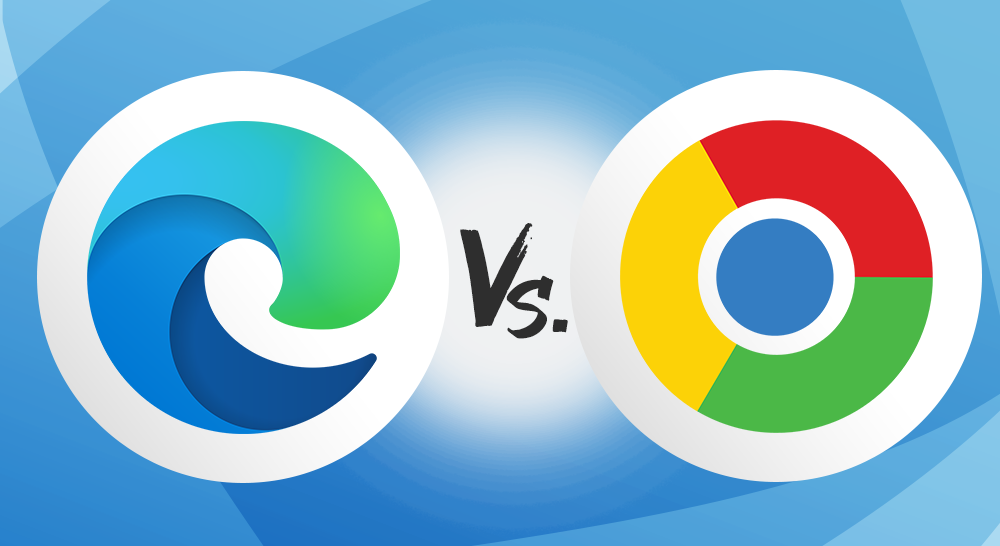Selecting your home computer was challenging enough. Now, we’re asking you to decide on the right PC browser, too? When will the decisions end? At least we’re making the comparison easier. This article helps you decide if Google Chrome or Microsoft Edge works best for you.
It’s estimated that the average individual spends almost a third of their day online. That means you likely already have a go-to browser. It may be the one that was pre-loaded on your computer when you bought it or the same one you’re using on your mobile devices, but those aren’t the best reasons to select a browser. Keep reading to learn the key features of Google Chrome and Microsoft Edge.
Google Chrome vs. Microsoft Edge: The Basics
Google Chrome is today’s most popular browser worldwide. It has been around since 2008 when it was released to compete with Internet Explorer. At that time, Internet Explorer was the big-shot browser, but within a few years, Google had taken the title. Explorer was replaced with Edge, which Microsoft brought out with Windows 10 in 2015.
Chrome and Edge are available for Windows, macOS, Android, and iOS devices. They are both based on the open-source software, Chromium. Still, Edge has a long way to go before it will reign supreme. In July 2021, Chrome had the lead at 65.27% market share. Safari came in second at 18.34%, and Edge third at 3.4%.
The two are not dramatically different. After all, they are competitors, so any big gap is quickly filled. Still, there are differences. Let’s discuss those next.
User Interface
Both Chrome and Edge allow you to have multiple windows open at the same time. Edge allows you to switch your tabs from horizontal (like Chrome) to vertical. You can group tabs by choosing a name and color for related tabs on both. Your tabs will sync with your mobile devices, but where the tabs appear on the screen will be different in Edge or Chrome mobile.
You can also bookmark (Chrome) or favorite (Edge) your pages. Edge allows you to create Collections of favorites. You can send those to Microsoft Docs, Excel, OneDrive, or Pinterest. Meanwhile, Chrome has a similar feature, and its collections can be shared with other Google account users.
If you want to choose the look of your browser (e.g. a theme or Dark Mode), there’s more flexibility with Chrome. Edge allows you to make choices from 14 themes in its Appearance settings. Otherwise, you’ll have to go to the Microsoft Edge Store.
Both browsers offer private browsing. Your default search engine will depend on your browser choice, though: Chrome uses Google to search (surprise!), whereas Microsoft defaults to Bing.
One standout feature of Edge is its immersive reader. This allows you to look at a page as if you are reading it on an ebook. It’s part of the basic Edge browser tools, but you’d have to add it as an extension if you wanted this in Chrome.
Need for Speed
If performance is important, you’ll want to know that Edge runs faster. There are competing claims, but Avast found Edge runs faster than both Chrome and Firefox. Another source tested the resource consumption of both browsers, and Chrome used more random-access memory (RAM).
Chrome did have the lead on cross-device syncing for a while, but in 2021 Edge added features making it convenient to switch between devices. Note: Chrome sync devices by default, whereas you need to enable it manually in Edge.
Security
Security and privacy are another big areas to consider when picking your browser. Browsers are common malware targets. You’ll want a browser that provides you with security features. Both Chrome and Edge do help you out, but if security is your top priority, look at Firefox, Tor, or Brave instead.
Still, since we’re comparing Chrome and Edge, let's talk about their security tools. Chrome allows you to send “do not track” requests to websites, but Edge allows you to be more selective. Users choose between three tracking-prevention levels and get a blocked tracker list.
Both browsers have built-in anti-malware and phishing protection, but Google is known for updating more regularly, which can keep you safer online. At the same time, though, Google collects more of your data.
Key Takeaway
Microsoft has been steadily closing the gap between its Edge offering and Chrome. For speed and resource consumption, Edge is claiming the lead. Of course, these are only two of the available browsers out there.
Want help deciding on the best browser for your home? We can help you set up your computers and answer any questions you may have. Call us today at (888) 234-WDIT(9348)!


 RSS Feed
RSS Feed
